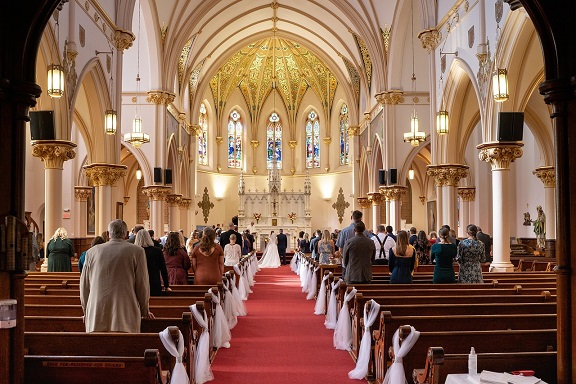
In Germany, saying “I do” is not as simple as exchanging rings and a kiss in front of family and friends. Legally speaking, a German marriage begins not in a chapel, garden, or ballroom – but at the Standesamt, the local registry office. Only this civil ceremony has legal status. A religious or symbolic ceremony can follow, but only after the civil one has taken place.
This dual system reflects a core German value: clear separation between church and state. It also highlights the country’s emphasis on legal structure and individual choice – blending public obligation with personal expression.
So, if you’re planning a wedding in Germany (or just curious how Germans get married), here’s everything you need to know about civil vs. church weddings – from legal requirements to cultural expectations.
Civil Weddings: The Legal Core of Marriage
The civil wedding (standesamtliche Trauung) is the only legally recognized marriage in Germany. No matter your religion or ceremony plans, the marriage is only official after this process.
Key Characteristics:
- Performed by a state official (Standesbeamter)
- Takes place at the Standesamt (registry office)
- Usually short (10-20 minutes)
- May include vows, music, or readings, but limited in scope
- Often followed by a champagne toast or brief celebration outside the building
Even couples who intend to have a grand church wedding must first marry at the Standesamt – often days or weeks earlier.
Documents and Legal Requirements
To marry civilly in Germany, both parties must provide documentation and fulfill eligibility requirements. These include:
Standard Documents:
- Valid passport or ID
- Birth certificate
- Proof of residence (Meldebescheinigung)
- Certificate of no impediment to marriage (Ehefähigkeitszeugnis) – varies by country
- Divorce decree or death certificate if previously married
Additional documents may be required for foreign nationals or non-German speakers. It’s best to check with the specific registry office several months in advance.
Fun Fact: Many foreigners are surprised by the precision and paperwork involved. It’s very German – and very official.
How It Works: Step-by-Step
- Make an appointment at the local Standesamt
- Submit documents (may take several weeks to verify)
- Schedule the ceremony – registry offices are often booked far in advance
- Attend the ceremony with witnesses (if desired – no longer required by law)
- Receive your marriage certificate (Eheurkunde)
Couples can choose between:
- A simple office wedding, held in the official registry space
- A decorated room or special location (some Standesämter offer scenic options like castles or gardens – for a fee)
Church Weddings: Tradition and Spiritual Significance
A church wedding (kirchliche Trauung) is purely symbolic – but deeply meaningful for many couples. It’s not required by law, but it remains a cherished tradition, especially in Christian communities.
Common Features:
- Takes place in a church or chapel
- Performed by a priest or pastor
- Includes prayers, hymns, a sermon, and often a blessing
- Can be customized with personal vows, readings, or music
- Often followed by the main wedding reception
Church weddings cannot legally take place before the civil ceremony. In fact, priests and pastors must see the marriage certificate before conducting a religious wedding.
Denominational Differences
Germany has a mix of Catholic, Protestant (Evangelical), and free church communities. Requirements and practices vary:
Catholic Church:
- Requires proof of baptism and confirmation
- Often includes pre-marital counseling
- Non-Catholic spouses may need special dispensation
Protestant Church:
- Typically more flexible
- Mixed-faith or secular couples often welcome
- Music and sermon are often personalized
Other Religions:
- Jewish, Muslim, Orthodox, and other communities perform religious ceremonies
- These are not legally binding in Germany without a civil ceremony
Secular and Symbolic Ceremonies
For non-religious couples, a growing trend is the freie Trauung – a free (or symbolic) wedding ceremony led by a celebrant or friend. These can be held:
- Outdoors
- At the reception venue
- In gardens, forests, or historical sites
They’re highly customizable, combining vows, storytelling, rituals, and even humor. Many multicultural couples choose this route to blend traditions from both families.
Related Tradition:
Polterabend: Why Germans Smash Plates Before the Wedding
What About Witnesses?
While German law no longer requires witnesses for civil marriages, many couples still choose to include:
- One or two friends or family members
- Witnesses who also sign the registry book
- Symbolic witnesses at the church or free ceremony
In religious ceremonies, witnesses (Trauzeugen) are often expected and honored, similar to best man/maid of honor roles.
Timeline: When Do These Ceremonies Happen?
Many couples space out their ceremonies:
- Civil ceremony first, often a few days or weeks before
- Religious or symbolic ceremony on the weekend, followed by the reception
Some even wear different outfits – modest attire for the registry, full wedding wear for the second event.
Cultural Meaning: Legal vs. Social Milestones
| Ceremony Type | Legal Status | Social Role | Common in… |
|---|---|---|---|
| Civil | Yes | Official marriage start | All marriages |
| Church | No | Spiritual or traditional celebration | Religious families |
| Free/Symbolic | No | Personal or blended ceremony | Secular/multicultural couples |
Germans are pragmatic about the law – but they also value symbolic gestures, rituals, and a sense of occasion. Most couples have at least one “big day” that family and friends attend – regardless of legal timing.
Choosing the Right Mix
There’s no single “correct” formula. Couples today choose based on:
- Beliefs and family traditions
- Budget and timing
- Bureaucratic challenges
- Personal meaning
Some even marry abroad legally, then hold a symbolic ceremony in Germany. Others reverse the order, registering locally after a destination wedding.
Key Takeaways
- In Germany, civil marriage is the only legally valid form – all other ceremonies are symbolic
- Church and free weddings offer tradition, spirituality, or personal meaning, but not legal status
- Many couples celebrate both, often on different days
- Understanding the roles of each helps you plan, attend, or appreciate a German wedding
Related Articles:
Wedding Traditions in Germany: From Sawing Logs to Polterabend
Polterabend: Why Germans Smash Plates Before the Wedding
Sawing the Log: The First Test of a German Marriage
From Kidnapped Brides to Wedding Newspapers: Quirky German Wedding Customs
German Wedding Tracht History







